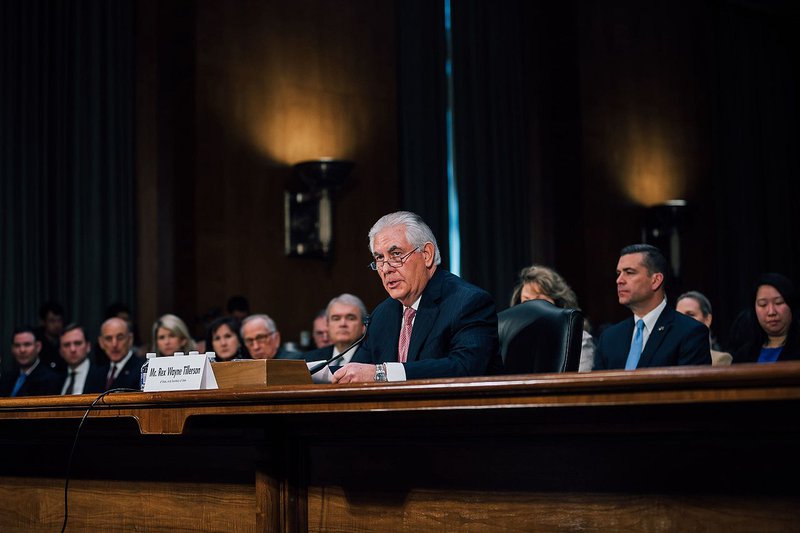
Flickr/Prachatai
March 13, 2018
Heather Hurlburt wrote about Rex Tillerson's impact on the State Department for New York Magazine.
Tillerson will leave a legacy, for sure. First, in the diminishment of his office — something which was not entirely his fault. Trump wasn’t the first president who couldn’t resist the temptation to be his own secretary of State, or to undercut his secretary to prevent him from gaining international stature that could rival his own. And as the National Security Council has grown in size and influence, and modern communications have allowed anyone to connect across national lines, State’s influence has been declining over the decades. But, with Trump’s gratuitous cruelty added to Tillerson’s missteps, Pompeo will get to Foggy Bottom with the prestige and clout of his office at its lowest ever. (It’s a long way down from Thomas Jefferson.) He may find that he misses the CIA.
Second, the State Department itself is — there’s no kind word for it — a mess. Tillerson achieved something that diplomatic geeks had tried and failed for 20 years — getting reporters, members of Congress, and even voters to care about State Department personnel policy. Not because he succeeded in reforming the Department to his vision, but because his ideas went so publicly awry. His plan to reform and restructure the State Department produced a steady leak of embarrassing PowerPoint slides and memos. Just last week a Politico reporter tweeted his deputy’s “Strategic Hiring Initiative” line by line, with commentary pointing out how much it seemed to presage further staff cuts. His ideas on personnel reforms — prevent spouses from working in embassies overseas, shut the pipeline of super-talented fellows entering the State Department out of graduate school, run every decision through a tiny team — produced headlines and outrage among people who had never cared much about State before.
More than 100 senior diplomats have resigned since Tillerson took office, leaving top ranks understaffed. At the same time, Tillerson canceled, delayed, or shrunk entire classes of new junior diplomats. As of last month, more than 100 ambassadorial positions were unfilled, as were many higher-level positions back in Washington. Not only is the department smaller, but most of its senior women, and officers of color, are gone — meaning that the service looks less like our country and less like the rest of the world with which it must interact. Gina Abercrombie-Winstanley, one of the senior ambassadors who chose to leave during Tillerson’s tenure, said: “No doubt we are as disappointed as he.”...
...This brings us to Tillerson’s final legacy, which is very far-reaching indeed. For more than six decades, Americans have simultaneously built up a specialized security bureaucracy and told themselves that any businessman (and it was always men) could do better than the people who’ve spent decades working inside it.
Tillerson wasn’t just any businessman. He had run an immense corporation and was well-regarded at home and abroad. He was certainly not as foolish as he was often made to appear. And yet, he would certainly have been better served by humility: both about the abilities of the men and women he led, and about his own limitations in trying to manage a president who prides himself on being unmanageable.